The new forums will be named Coin Return (based on the most recent vote)! You can check on the status and timeline of the transition to the new forums here.
The Guiding Principles and New Rules document is now in effect.
Nobody Expects the [SCOTUS] 5-4 Decision! (Read the OP)
Kagera Imitating the worst people. Since 2004Registered User regular
Imitating the worst people. Since 2004Registered User regular
 Imitating the worst people. Since 2004Registered User regular
Imitating the worst people. Since 2004Registered User regular
I'm quoting the previous OP because why mess with good OP?
Edit: Messing with OP to mention the wonderful SCOTUSBlog which is like TMZ if you took away everything TMZ does and added intelligence, expert reporting, and integrity.
Check it out today!
http://www.scotusblog.com/
I'm pretty sure most here know what the US Supreme Court is and a reasonable understanding of how it works. For those that don't or wish to refresh their knowledge on the US Supreme Court. This wiki article does a decent job of covering the basics of how the court works and this wiki article does a decent job of covering how the court is filled.
As a side note, given that the Supreme Court is the highest court in the land and that both the President and US Senate influence who serves on the court. This makes voting in Presidential and Senate elections rather important for everyone. This also indirectly makes elections for other offices below Senate and Presidential races important since lower races tend to generate the roster for future candidates for higher offices. Granted voting is important period, but the above is what's pertinent to the topic of this thread.
The Roberts Court: This court is considered more conservative than it's predecessor. Roberts, Alito, Scalia, Thomas and Kennedy are considered the five conservatives of the court. With Kagan, Sotomayor, Breyer and Ginsburg being the court's liberals. Kennedy tends to be a swing vote for this court; however, Roberts has been the critical vote in at least one ruling thus far (ACA for those that currently don't know). The Roberts Court has also been criticized for being too divided on the issues and has issues a number of 5 to 4 rulings.
http://www.supremecourt.gov is a good sources to see what is on the Court's docket and to read up on opinions.
(When I get time, I'll try to put a list of potential major decisions here. I'm open to suggestions BTW)
Expectations for this thread
1. This is not the general politics or lol this party sucks thread.
2. This is a thread about the US Supreme Court, if it doesn't have anything to do with SCOTUS, it doesn't belong here.
3. Not all things about SCOTUS belong here. Some cases dealing with certain issues, already have a thread or their own god damn separate thread that is more appropriate to discuss a certain SCOTUS rulings or cases. List of current topics that may be coming before the Court that are better served by another thread (I'll try to keep this updated and include links to the relevant threads:
5. In the event that we get a SCOTUS vacancy in the lifetime of this thread, this would probably be the best place to discuss such an appointment given how low traffic this thread is likely to be.
6. Stuff regarding 2014 starts here.
Old OP for prosperity, but mostly so that people responding to it don't look insane. :P
Edit: Messing with OP to mention the wonderful SCOTUSBlog which is like TMZ if you took away everything TMZ does and added intelligence, expert reporting, and integrity.
Check it out today!
http://www.scotusblog.com/
I'm pretty sure most here know what the US Supreme Court is and a reasonable understanding of how it works. For those that don't or wish to refresh their knowledge on the US Supreme Court. This wiki article does a decent job of covering the basics of how the court works and this wiki article does a decent job of covering how the court is filled.
As a side note, given that the Supreme Court is the highest court in the land and that both the President and US Senate influence who serves on the court. This makes voting in Presidential and Senate elections rather important for everyone. This also indirectly makes elections for other offices below Senate and Presidential races important since lower races tend to generate the roster for future candidates for higher offices. Granted voting is important period, but the above is what's pertinent to the topic of this thread.
The Current Justices
Biographies and photos copied from http://www.supremecourt.gov/about/biographies.aspx.
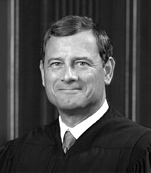
John G. Roberts, Jr., Chief Justice of the United States,
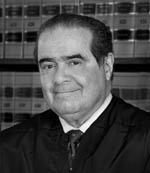
Antonin Scalia, Associate Justice,
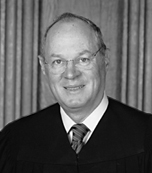
Anthony M. Kennedy, Associate Justice,

Clarence Thomas, Associate Justice,
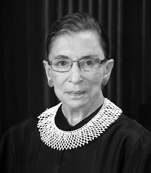
Ruth Bader Ginsburg, Associate Justice,
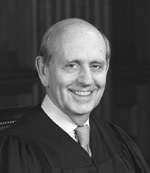
Stephen G. Breyer, Associate Justice,
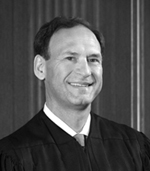
Samuel Anthony Alito, Jr., Associate Justice,
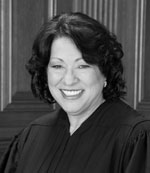
Sonia Sotomayor, Associate Justice,
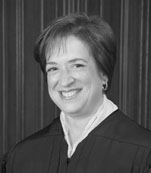
Elena Kagan, Associate Justice,
Biographies and photos copied from http://www.supremecourt.gov/about/biographies.aspx.

John G. Roberts, Jr., Chief Justice of the United States,
was born in Buffalo, New York, January 27, 1955. He married Jane Marie Sullivan in 1996 and they have two children - Josephine and John. He received an A.B. from Harvard College in 1976 and a J.D. from Harvard Law School in 1979. He served as a law clerk for Judge Henry J. Friendly of the United States Court of Appeals for the Second Circuit from 1979–1980 and as a law clerk for then-Associate Justice William H. Rehnquist of the Supreme Court of the United States during the 1980 Term. He was Special Assistant to the Attorney General, U.S. Department of Justice from 1981–1982, Associate Counsel to President Ronald Reagan, White House Counsel’s Office from 1982–1986, and Principal Deputy Solicitor General, U.S. Department of Justice from 1989–1993. From 1986–1989 and 1993–2003, he practiced law in Washington, D.C. He was appointed to the United States Court of Appeals for the District of Columbia Circuit in 2003. President George W. Bush nominated him as Chief Justice of the United States, and he took his seat September 29, 2005.

Antonin Scalia, Associate Justice,
was born in Trenton, New Jersey, March 11, 1936. He married Maureen McCarthy and has nine children - Ann Forrest, Eugene, John Francis, Catherine Elisabeth, Mary Clare, Paul David, Matthew, Christopher James, and Margaret Jane. He received his A.B. from Georgetown University and the University of Fribourg, Switzerland, and his LL.B. from Harvard Law School, and was a Sheldon Fellow of Harvard University from 1960–1961. He was in private practice in Cleveland, Ohio from 1961–1967, a Professor of Law at the University of Virginia from 1967–1971, and a Professor of Law at the University of Chicago from 1977–1982, and a Visiting Professor of Law at Georgetown University and Stanford University. He was chairman of the American Bar Association’s Section of Administrative Law, 1981–1982, and its Conference of Section Chairmen, 1982–1983. He served the federal government as General Counsel of the Office of Telecommunications Policy from 1971–1972, Chairman of the Administrative Conference of the United States from 1972–1974, and Assistant Attorney General for the Office of Legal Counsel from 1974–1977. He was appointed Judge of the United States Court of Appeals for the District of Columbia Circuit in 1982. President Reagan nominated him as an Associate Justice of the Supreme Court, and he took his seat September 26, 1986.

Anthony M. Kennedy, Associate Justice,
was born in Sacramento, California, July 23, 1936. He married Mary Davis and has three children. He received his B.A. from Stanford University and the London School of Economics, and his LL.B. from Harvard Law School. He was in private practice in San Francisco, California from 1961–1963, as well as in Sacramento, California from 1963–1975. From 1965 to 1988, he was a Professor of Constitutional Law at the McGeorge School of Law, University of the Pacific. He has served in numerous positions during his career, including a member of the California Army National Guard in 1961, the board of the Federal Judicial Center from 1987–1988, and two committees of the Judicial Conference of the United States: the Advisory Panel on Financial Disclosure Reports and Judicial Activities, subsequently renamed the Advisory Committee on Codes of Conduct, from 1979–1987, and the Committee on Pacific Territories from 1979–1990, which he chaired from 1982–1990. He was appointed to the United States Court of Appeals for the Ninth Circuit in 1975. President Reagan nominated him as an Associate Justice of the Supreme Court, and he took his seat February 18, 1988.

Clarence Thomas, Associate Justice,
was born in the Pin Point community of Georgia near Savannah June 23, 1948. He married Virginia Lamp in 1987 and has one child, Jamal Adeen, by a previous marriage. He attended Conception Seminary and received an A.B., cum laude, from Holy Cross College, and a J.D. from Yale Law School in 1974. He was admitted to law practice in Missouri in 1974, and served as an Assistant Attorney General of Missouri from 1974–1977, an attorney with the Monsanto Company from 1977–1979, and Legislative Assistant to Senator John Danforth from 1979–1981. From 1981–1982, he served as Assistant Secretary for Civil Rights, U.S. Department of Education, and as Chairman of the U.S. Equal Employment Opportunity Commission from 1982–1990. He became a Judge of the United States Court of Appeals for the District of Columbia Circuit in 1990. President Bush nominated him as an Associate Justice of the Supreme Court, and he took his seat October 23, 1991.

Ruth Bader Ginsburg, Associate Justice,
was born in Brooklyn, New York, March 15, 1933. She married Martin D. Ginsburg in 1954, and has a daughter, Jane, and a son, James. She received her B.A. from Cornell University, attended Harvard Law School, and received her LL.B. from Columbia Law School. She served as a law clerk to the Honorable Edmund L. Palmieri, Judge of the United States District Court for the Southern District of New York, from 1959–1961. From 1961–1963, she was a research associate and then associate director of the Columbia Law School Project on International Procedure. She was a Professor of Law at Rutgers University School of Law from 1963–1972, and Columbia Law School from 1972–1980, and a fellow at the Center for Advanced Study in the Behavioral Sciences in Stanford, California from 1977–1978. In 1971, she was instrumental in launching the Women’s Rights Project of the American Civil Liberties Union, and served as the ACLU’s General Counsel from 1973–1980, and on the National Board of Directors from 1974–1980. She was appointed a Judge of the United States Court of Appeals for the District of Columbia Circuit in 1980. President Clinton nominated her as an Associate Justice of the Supreme Court, and she took her seat August 10, 1993.

Stephen G. Breyer, Associate Justice,
was born in San Francisco, California, August 15, 1938. He married Joanna Hare in 1967, and has three children - Chloe, Nell, and Michael. He received an A.B. from Stanford University, a B.A. from Magdalen College, Oxford, and an LL.B. from Harvard Law School. He served as a law clerk to Justice Arthur Goldberg of the Supreme Court of the United States during the 1964 Term, as a Special Assistant to the Assistant U.S. Attorney General for Antitrust, 1965–1967, as an Assistant Special Prosecutor of the Watergate Special Prosecution Force, 1973, as Special Counsel of the U.S. Senate Judiciary Committee, 1974–1975, and as Chief Counsel of the committee, 1979–1980. He was an Assistant Professor, Professor of Law, and Lecturer at Harvard Law School, 1967–1994, a Professor at the Harvard University Kennedy School of Government, 1977–1980, and a Visiting Professor at the College of Law, Sydney, Australia and at the University of Rome. From 1980–1990, he served as a Judge of the United States Court of Appeals for the First Circuit, and as its Chief Judge, 1990–1994. He also served as a member of the Judicial Conference of the United States, 1990–1994, and of the United States Sentencing Commission, 1985–1989. President Clinton nominated him as an Associate Justice of the Supreme Court, and he took his seat August 3, 1994.

Samuel Anthony Alito, Jr., Associate Justice,
was born in Trenton, New Jersey, April 1, 1950. He married Martha-Ann Bomgardner in 1985, and has two children - Philip and Laura. He served as a law clerk for Leonard I. Garth of the United States Court of Appeals for the Third Circuit from 1976–1977. He was Assistant U.S. Attorney, District of New Jersey, 1977–1981, Assistant to the Solicitor General, U.S. Department of Justice, 1981–1985, Deputy Assistant Attorney General, U.S. Department of Justice, 1985–1987, and U.S. Attorney, District of New Jersey, 1987–1990. He was appointed to the United States Court of Appeals for the Third Circuit in 1990. President George W. Bush nominated him as an Associate Justice of the Supreme Court, and he took his seat January 31, 2006.

Sonia Sotomayor, Associate Justice,
was born in Bronx, New York, on June 25, 1954. She earned a B.A. in 1976 from Princeton University, graduating summa cum laude and receiving the university's highest academic honor. In 1979, she earned a J.D. from Yale Law School where she served as an editor of the Yale Law Journal. She served as Assistant District Attorney in the New York County District Attorney's Office from 1979–1984. She then litigated international commercial matters in New York City at Pavia & Harcourt, where she served as an associate and then partner from 1984–1992. In 1991, President George H.W. Bush nominated her to the U.S. District Court, Southern District of New York, and she served in that role from 1992–1998. She served as a judge on the United States Court of Appeals for the Second Circuit from 1998–2009. President Barack Obama nominated her as an Associate Justice of the Supreme Court on May 26, 2009, and she assumed this role August 8, 2009.

Elena Kagan, Associate Justice,
was born in New York, New York, on April 28, 1960. She received an A.B. from Princeton in 1981, an M. Phil. from Oxford in 1983, and a J.D. from Harvard Law School in 1986. She clerked for Judge Abner Mikva of the U.S. Court of Appeals for the D.C. Circuit from 1986-1987 and for Justice Thurgood Marshall of the U.S. Supreme Court during the 1987 Term. After briefly practicing law at a Washington, D.C. law firm, she became a law professor, first at the University of Chicago Law School and later at Harvard Law School. She also served for four years in the Clinton Administration, as Associate Counsel to the President and then as Deputy Assistant to the President for Domestic Policy. Between 2003 and 2009, she served as the Dean of Harvard Law School. In 2009, President Obama nominated her as the Solicitor General of the United States. After serving in that role for a year, the President nominated her as an Associate Justice of the Supreme Court on May 10, 2010. She took her seat on August 7, 2010.
The Roberts Court: This court is considered more conservative than it's predecessor. Roberts, Alito, Scalia, Thomas and Kennedy are considered the five conservatives of the court. With Kagan, Sotomayor, Breyer and Ginsburg being the court's liberals. Kennedy tends to be a swing vote for this court; however, Roberts has been the critical vote in at least one ruling thus far (ACA for those that currently don't know). The Roberts Court has also been criticized for being too divided on the issues and has issues a number of 5 to 4 rulings.
http://www.supremecourt.gov is a good sources to see what is on the Court's docket and to read up on opinions.
(When I get time, I'll try to put a list of potential major decisions here. I'm open to suggestions BTW)
Expectations for this thread
1. This is not the general politics or lol this party sucks thread.
2. This is a thread about the US Supreme Court, if it doesn't have anything to do with SCOTUS, it doesn't belong here.
3. Not all things about SCOTUS belong here. Some cases dealing with certain issues, already have a thread or their own god damn separate thread that is more appropriate to discuss a certain SCOTUS rulings or cases. List of current topics that may be coming before the Court that are better served by another thread (I'll try to keep this updated and include links to the relevant threads:
- Anything that has to do with Obamacare (ACA): The Religious Objections to contraception coverage comes to mind.
- Voting Rights
- Reproductive Rights, that don't deal specifically with things in ACA
- Gun Rights: Seriously, if we get a ruling deal with gun rights, it'll need it's own god damn separate thread since any tangent on them tends to dominate and derail any political thread they show up in.
5. In the event that we get a SCOTUS vacancy in the lifetime of this thread, this would probably be the best place to discuss such an appointment given how low traffic this thread is likely to be.
6. Stuff regarding 2014 starts here.
Old OP for prosperity, but mostly so that people responding to it don't look insane. :P
So I'm pretty sure we're all familiar with the shitty Citizens United ruling from 2010. On the off chance that someone stumbles onto this thread that has either lived under a fucking rock or managed to remain oblivious to this travesty of a ruling. Here is a brief summation. Five dumbasses on SCOTUS decided that it was unconstitutional to limit independent contributions from corporations and unions. Apparently they viewed money as speech and felt that the current campaign finance laws were just too mean to the wealthy by restricting their speech through money. This has led the creation of superPACs which turned out lots of obnoxious and terrible ads during the 2012 election. The only redeeming thing out of the whole well was Colbert's superPAC Americans for a Better Tomorrow, Tomorrow, which intention or not, highlighted just how absurd the whole thing is.
So you might be asking, WTF does that have to do with cases that are being heard before SCOTUS in the year 2013. Well Citizens United was only a blow that struck one the pillars of campaign finance regulations, the court is now taking up a case to consider the constitutionality of the other pillar dealing with political gifts. The ruling from that case could also end up being, as shitty as, Citizens United given how bad it would be for trying to keep corruption out of politics.
So the gist of this case is that an Alabama man named Shaun McCutcheon and the Republican National Committee feel that aggregate limits, their overall contributions to multiple candidate or committees, is too onerous. Pretty much they want to be able to donate money to an unlimited number of candidates and political committees.
Rght now the shitty billionaires and millionaires that want to fuck everyone over, who aren't wealth have to pick and choose which shitty ass republican candidates they try to help get elected. In the case of McCutcheon, he was only able to contribute money to 16 federal candidates in recent elections and there were another 12 that he wanted to support but he had capped his contributions. So without the limits, McCutcheon would have been donating money to at least 28 different federal candidates. I'm pretty sure no sane person wants to live in a country were Joe Regressive Ass Bigot Billionaire and his buddies can bankroll every republican candidate that is running at the federal level. I'd argue that our current caps are probably too generous given that McCutcheon was able to donate to 16 different federal candidates.
Now given that our current court gave us the shitty, shitty decision known as Citizens United, I'm worried that by taking this case up, they give us another terrible ruling that allows the rich more leverage to fuck over everyone. I'm not optimistic that we'll see SCOTUS tell these people to fuck off because money tends to be corrupting and there is too much of it in politics.
Here's the link to where I first heard about this case.
BTW I'm not opposed to turning this thread into a discussion on other cases being brought before SCOTUS. I'll just ask that if there is a thread pertaining to the topic of what a case is covering (for example gun control), that only the case gets mentioned and that actually discussion of the case be moved to the relevant thread. I didn't see a SCOTUS thread before posting this and I tried the search function (let's not talk about how that went).
So you might be asking, WTF does that have to do with cases that are being heard before SCOTUS in the year 2013. Well Citizens United was only a blow that struck one the pillars of campaign finance regulations, the court is now taking up a case to consider the constitutionality of the other pillar dealing with political gifts. The ruling from that case could also end up being, as shitty as, Citizens United given how bad it would be for trying to keep corruption out of politics.
So the gist of this case is that an Alabama man named Shaun McCutcheon and the Republican National Committee feel that aggregate limits, their overall contributions to multiple candidate or committees, is too onerous. Pretty much they want to be able to donate money to an unlimited number of candidates and political committees.
Rght now the shitty billionaires and millionaires that want to fuck everyone over, who aren't wealth have to pick and choose which shitty ass republican candidates they try to help get elected. In the case of McCutcheon, he was only able to contribute money to 16 federal candidates in recent elections and there were another 12 that he wanted to support but he had capped his contributions. So without the limits, McCutcheon would have been donating money to at least 28 different federal candidates. I'm pretty sure no sane person wants to live in a country were Joe Regressive Ass Bigot Billionaire and his buddies can bankroll every republican candidate that is running at the federal level. I'd argue that our current caps are probably too generous given that McCutcheon was able to donate to 16 different federal candidates.
Now given that our current court gave us the shitty, shitty decision known as Citizens United, I'm worried that by taking this case up, they give us another terrible ruling that allows the rich more leverage to fuck over everyone. I'm not optimistic that we'll see SCOTUS tell these people to fuck off because money tends to be corrupting and there is too much of it in politics.
Here's the link to where I first heard about this case.
BTW I'm not opposed to turning this thread into a discussion on other cases being brought before SCOTUS. I'll just ask that if there is a thread pertaining to the topic of what a case is covering (for example gun control), that only the case gets mentioned and that actually discussion of the case be moved to the relevant thread. I didn't see a SCOTUS thread before posting this and I tried the search function (let's not talk about how that went).
My neck, my back, my FUPA and my crack.
Kagera on
0
This discussion has been closed.
Posts
This isn't a bad thing necessarily, more just a difference. Yours have a much stronger role in constitutional affairs so maybe that wider/diverse background is useful.
I would expect it's more that you only get nominated if you've got the political connections.
While that is part of it you also can't have a record that is muddy ideologically. If they suspect for even a moment your views might "evolve" they will drop you as fast as you can say "Sandra Day O'Connor".
That too. Picking judges can be hard work, more so if they have real political power.
If we could wave a magic wand and get congress to pass a bill clarifying the distinction between the two, a lot of these problematic rulings (especially citizen's united) go the fuck away.
I think Hobby Lobby is separate from that.
The ruling discusses closely-held corporations and is more about corporations not causing its owners to lose their own rights. It's still sketchy, but it's a different kind of sketchy.
Because to me, it seems more like the ruling is about establishing a state-sponsored religion by carving out a single exception to the law. We've been through this over and over again, but if forcing employers to buy health insurance that includes the potential for birth control violates the rights of owners, how does it not violate the rights of Christian Scientists?
The logic is extremely inconsistent, which is only part of the reason it's a terrible ruling.
The owners are not losing any rights. Nobody has asked them to pay for contraception. The mandate applies to the corporation, which is not the same thing as its owners - that is the whole point of having a corporation.
Well, yes. That's the entire reason this is a bad decision, legally speaking. The ruling is about the owners, not the corporation.
If the religious beliefs of the owners did not somehow transfer to their company then this ruling would not have been made. It's very much about corporate personhood. After all, it is not the owner that is personally providing his money to purchase these contraceptives. It is the company that is doing that (Let's leave aside, for the moment, that it's actually the employee paying for it). So if the owner's religious beliefs didn't impose themselves on the company, then the "link" becomes even more tenuous.
If a company were not an entity capable of having religious beliefs this could never have happened.
Are they going to further expand corporate personhood and religious exemptions?
Or are they going to take the logical extension of corporate control over compensation and allow companies to further restrict what their employees can buy with the money they pay them?
twitch.tv/Taramoor
@TaramoorPlays
Taramoor on Youtube
Yes.
PSN/Steam/NNID: SyphonBlue | BNet: SyphonBlue#1126
Because my heart couldn't take it.
twitch.tv/Taramoor
@TaramoorPlays
Taramoor on Youtube
Of course, that was specifically for nonprofits and maybe it was just held up as an example of what could be done with for-profit corporations, and not something that actually will happen. (Also, Hobby Lobby was only against a few types of contraception but there's nothing stopping them from being against any/all of them.)
Honey badger SCOTUS don't give a shit.
All hail our Lord and Savior , ElJeffe!
Because Lord knows he would be a much better, by infinity, SCOTUS, than this current crop of a few Asshat SCTOUSes fucking things up.
All. By. Him. Self.
And although, Scalia could be funny at times, my GOD is he punchable. I wonder how the other, native New Yorker Judges really feel about him?
The problem is with the Wheaton College ruling (that hasn't actually happened yet, but the SC granted an emergency injunction to the college) which is pushing the notion that the employer doesn't have to fill out the form for the exemption laid out by the Hobby Lobby decision but they also don't have to provide coverage for birth control. So right now, the employees of Wheaton College would have to find their own way to get coverage for birth control. I'm not sure if the employees qualify for the coverage under the same system as non-profits if their employer never files for a religious exemption from the mandate.
Yeah, didn't the addendum put out by SCOTUS specifically declare that this ruling could apply to contraception generally, not just those four types?
"Oh, and PS, we're shitting on all forms of contraception. You know, in case there was any confusion."
Unless I'm misremembering.
Because waiting for a case with standing over an issue is for losers.
Basically, in order for the government to provide coverage via alternative means (by making the insurance company provide for it) they need to be given authorization to do so (specifically by the form in question, which makes the insurance company a "plan administrator" and therefore allowed to do things or whatever).
However, SCOTUS says that the informal notification is enough, even if legally it might not be. Why?
Because SCOTUS says so.
Absolutely.
Any overt action on the part of the religious objector that results in birth control being issued is going to meet the same logical end.
Not only is it incredible in a pun sense, it's... well...
Of course, the whole point of corporations is to remove the owner's personal legal liabilities. Just another way this court is completely bugfuck insane.
That was my favorite part. They broaden the ruling to include all contraception, but include this in the ruling proper:
It's ok to generalize from our ruling on four contraception methods to all contraception methods, but don't generalize to blood transfusions, because those are real medicine, or something.
Which once again plays into the whole Catholic Court thing.
What is the one medical procedure that the Catholic church hates? Birth Control!
Which is the one medical procedure that this ruling forbids? Birth Control!
How does the Church stand on Vaccines and Blood transfusions? Supports them!
What does the Hobby lobby ruling say on Vaccines and Blood Transfusions? Don't come peddling your fake religion here!
Fast forward to now. So, remember the Tenth Circuit gay marriage ban cases and how they were overturned pending appeal? Utah's Attorney General is appealing...to the Supreme Court.
Neither can I, SCOTUSblog. Neither can I
Steam
Yeah. Who doesn't hate gay people, usually.
Catholics are the ones who have "fuck birth control" officially codified into their religion, but it's also a pretty popular sentiment among conservative evangelicals. The "in my day, girls just put an aspirin between her knees" guy is an evangelical, and it certainly wasn't just Catholics in the "Sandra Fluke is a big whore" brigade.
They might not think use of the pill itself is immoral, but they certainly seem to think that needing to use it is problematic.
If Kennedy joins the liberals on a gay marriage case I expect Roberts to join too, so he can write the opinion.
Well, actually, Justice Thomas is sleeping, but if he was awake he'd totally shake his bare hiney."